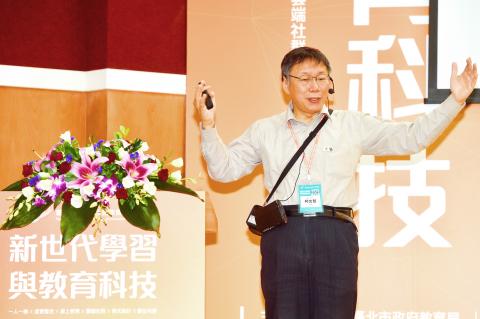A Taipei City Government online education database called “CooC-Cloud” could help the nation demonstrate its “soft power,” Taipei Mayor Ko Wen-je (柯文哲) said yesterday, adding that information technology-based education could be a game changer.
Ko made the remarks in a speech at the two-day 11th Taipei International Conference of Innovative ICT Education, which opened yesterday at Taipei Municipal Zhonglun High School.
“The theme of this year’s event is learning and teaching new-age technologies. That is: Creating a more student-oriented learning environment with the help of innovative technologies,” Ko said.

Photo: Peter Lo, Taipei Times
The conference features more than 40 speakers from IT backgrounds from Taiwan, Hong Kong, Shanghai and Japan who gave talks on applications of augmented reality and virtual reality technologies in education, mobile devices as learning tools and experiences in offering online courses.
Speakers from the municipal government introduced the “CooC-Cloud,” which was launched in August.
The platform was created by the Taipei departments of Education and Information Technology and contains learning material designed by students from elementary to senior-high-school level.
“I have often said that your enemies are your best mentors,” Ko said. “Of course, the people we are going to learn from cannot be called our enemies, but it would allow us an opportunity to see how others have fared. I think this will be crucial to our development.”
Taipei is the most advanced city in Taiwan, so if it can integrate information technology with education, it will likely bring about a change for the nation, he said.
The Web site, http://cooc.tp.edu.tw, is not only available to students in Taipei, but throughout the nation, Ko said, adding that it can be improved with the addition of a translator to display its contents in simplified Chinese, so that Chinese students can also use it.
“This would help to demonstrate the nation’s soft power, which is aimed at sharing one’s beliefs,” he said.
In comments that shifted away from the program, Ko said that the nation’s information-technology sector needed a dose of “changing your brain once you change your position” — a Chinese-language idiom often used to criticize politicians who recant their positions shortly after a rise in power.
This is important for it to remain innovative, he said.
The mayor said that if he was allowed to respond freely, he would “definitely” outperform Taipei Agricultural Products Marketing Co general manager Han Kuo-yu (韓國瑜) at Taipei City Council question-and-answer sessions.
Han has received wide public attention over his responses to councilors who raised questions about his firm’s operations, which have been called witty and confident.
Separately, Democratic Progressive Party (DPP) Taipei city councilors Ho Chih-wei (何志偉) and Wang Shih-chien (王世堅) criticized Ko’s remarks.
Ho said the Ko administration had performed poorly in attracting foreign investments and contractors to join build-operate-transfer projects.
Ho also said it has failed to tackle unemployment among young people.
“As a mayor, he should focus on his work instead of saying something like that,” Ho said.
Wang, who last month traded barbs with Han at the city council, told Ko to “bring it on.”
Ko’s performance at the city council over the past two years has exposed many weaknesses in his team, Wang said.

The first global hotel Keys Selection by the Michelin Guide includes four hotels in Taiwan, Michelin announced yesterday. All four received the “Michelin One Key,” indicating guests are to experience a “very special stay” at any of the locations as the establishments are “a true gem with personality. Service always goes the extra mile, and the hotel provides much more than others in its price range.” Of the four hotels, three are located in Taipei and one in Taichung. In Taipei, the One Key accolades were awarded to the Capella Taipei, Kimpton Da An Taipei and Mandarin Oriental Taipei. Capella Taipei was described by

The Taichung District Court yesterday confirmed its final ruling that the marriage between teenage heir Lai (賴) and a man surnamed Hsia (夏) was legally invalid, preventing Hsia from inheriting Lai’s NT$500 million (US$16.37 million) estate. The court confirmed that Hsia chose not to appeal the civil judgement after the court handed down its ruling in June, making the decision final. In the June ruling, the court said that Lai, 18, and Hsia, 26, showed “no mutual admiration before the marriage” and that their interactions were “distant and unfamiliar.” The judge concluded that the couple lacked the “true intention of

EVA Airways today confirmed the death of a flight attendant on Saturday upon their return to Taiwan and said an internal investigation has been launched, as criticism mounted over a social media post accusing the airline of failing to offer sufficient employee protections. According to the post, the flight attendant complained of feeling sick on board a flight, but was unable to take sick leave or access medical care. The crew member allegedly did not receive assistance from the chief purser, who failed to heed their requests for medical attention or call an ambulance once the flight landed, the post said. As sick

INDUSTRY: Beijing’s latest export measures go beyond targeting the US and would likely affect any country that uses Chinese rare earths or related tech, an academic said Taiwanese industries could face significant disruption from China’s newly tightened export controls on rare earth elements, as much of Taiwan’s supply indirectly depends on Chinese materials processed in Japan, a local expert said yesterday. Kristy Hsu (徐遵慈), director of the Taiwan ASEAN Studies Center at the Chung-Hua Institution for Economic Research, said that China’s latest export measures go far beyond targeting the US and would likely affect any country that uses Chinese rare earths or related technologies. With Japan and Southeast Asian countries among those expected to be hit, Taiwan could feel the impact through its reliance on Japanese-made semi-finished products and